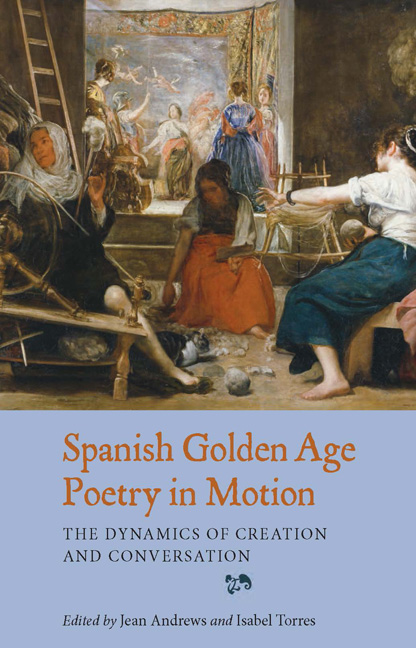Book contents
- Frontmatter
- Contents
- Contributors
- Acknowledgements
- Introduction
- 1 La poesía mutante del Siglo de Oro
- Part 1 Poetry in Creation
- 2 Moving in …Garcilaso de la Vega's ‘Dulces prendas por mi mal halladas’
- 3 The Movement of Thought and Feeling in the ‘Ode to Juan de Grial’
- 4 Metaphors of Movement in Two Poems of Fray Luis de León
- 5 El tiempo medido en versos: Camila Lucinda en las Rimas (1609) de Lope de Vega
- 6 Upwards to Helicon: Lope de Vega, the Laurel de Apolo, and Acts of Judgement
- 7 ‘Dulce es refugio’: El peregrino de Góngora se detiene
- 8 The Staging of Góngora's Three Funereal Sonnets for Margarita de Austria Estiria
- 9 Jealousy in María de Zayas's Intercalated Poetry: Lyric Illness and Narrative Cure
- 10 Hacia otra lectura del petrarquismo en Sor Juana Inés de la Cruz
- Part 2 Poetry in Conversation
- 11 El conde de Salinas y Leonor Pimentel: cuando se juntan el amor y la poesía
- 12 Poesía popular en movimiento: los jeroglíficos ‘muy propios al intento y muy de su profesión’ en las celebraciones de la Valencia barroca
- 13 Responding to Góngora: María Rosal and the Clori Poems
- 14 Traveling in Place: Baroque Lyric Transports in Translation, or Flames that Bridge the Stream
- Works Cited
- Index
Introduction
Published online by Cambridge University Press: 05 November 2014
- Frontmatter
- Contents
- Contributors
- Acknowledgements
- Introduction
- 1 La poesía mutante del Siglo de Oro
- Part 1 Poetry in Creation
- 2 Moving in …Garcilaso de la Vega's ‘Dulces prendas por mi mal halladas’
- 3 The Movement of Thought and Feeling in the ‘Ode to Juan de Grial’
- 4 Metaphors of Movement in Two Poems of Fray Luis de León
- 5 El tiempo medido en versos: Camila Lucinda en las Rimas (1609) de Lope de Vega
- 6 Upwards to Helicon: Lope de Vega, the Laurel de Apolo, and Acts of Judgement
- 7 ‘Dulce es refugio’: El peregrino de Góngora se detiene
- 8 The Staging of Góngora's Three Funereal Sonnets for Margarita de Austria Estiria
- 9 Jealousy in María de Zayas's Intercalated Poetry: Lyric Illness and Narrative Cure
- 10 Hacia otra lectura del petrarquismo en Sor Juana Inés de la Cruz
- Part 2 Poetry in Conversation
- 11 El conde de Salinas y Leonor Pimentel: cuando se juntan el amor y la poesía
- 12 Poesía popular en movimiento: los jeroglíficos ‘muy propios al intento y muy de su profesión’ en las celebraciones de la Valencia barroca
- 13 Responding to Góngora: María Rosal and the Clori Poems
- 14 Traveling in Place: Baroque Lyric Transports in Translation, or Flames that Bridge the Stream
- Works Cited
- Index
Summary
Homer knew that poetry is a matter of motion. Once upon a pre-‘theoretical’ time, criticism of poetry inhabited poetry itself. It was inscribed in the self-conscious reflections of the early poets on the nature of their art, and in the narratological and metaphorical manoeuvres of their writing. The opening line of the Iliad compresses into a brief invocation to the Muse the essence of poetry as a specialised form of discourse that travels over time and space, while it also points to the authority and accountability that is enshrined in poetic utterance. The narrator invokes the Muse: ‘Sing, goddess, the wrath of Peleus’ son, Achilles’. In this appeal to the daughter of Memory, there is more than a glimpse of poetry as the repository, mediator and voice of privileged knowledge, and a sense of its role as a dynamic locus of ideological value transfer and its claims to both temporal possession and timeless permanence. For in poetry's access to the past, its re-articulations in present upon present, it pretends to be owned by and to ‘own’ time. There are tensions in the Homeric figuring of poetry, and the poet's role, that would move theoretical debate for centuries: the compatibility of divine inspiration and artistic craftsmanship, the truth value of constructed poetic illusion, the stability of poetry's claim to communicate ethical wisdom, the affective power of its eloquence and the risks both for the individual body and for the body politic that might follow from intense emotional response.
- Type
- Chapter
- Information
- Spanish Golden Age Poetry in MotionThe Dynamics of Creation and Conversation, pp. 1 - 8Publisher: Boydell & BrewerPrint publication year: 2014



